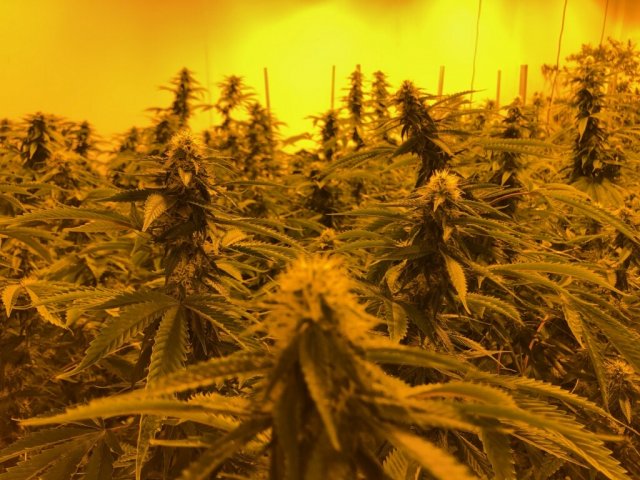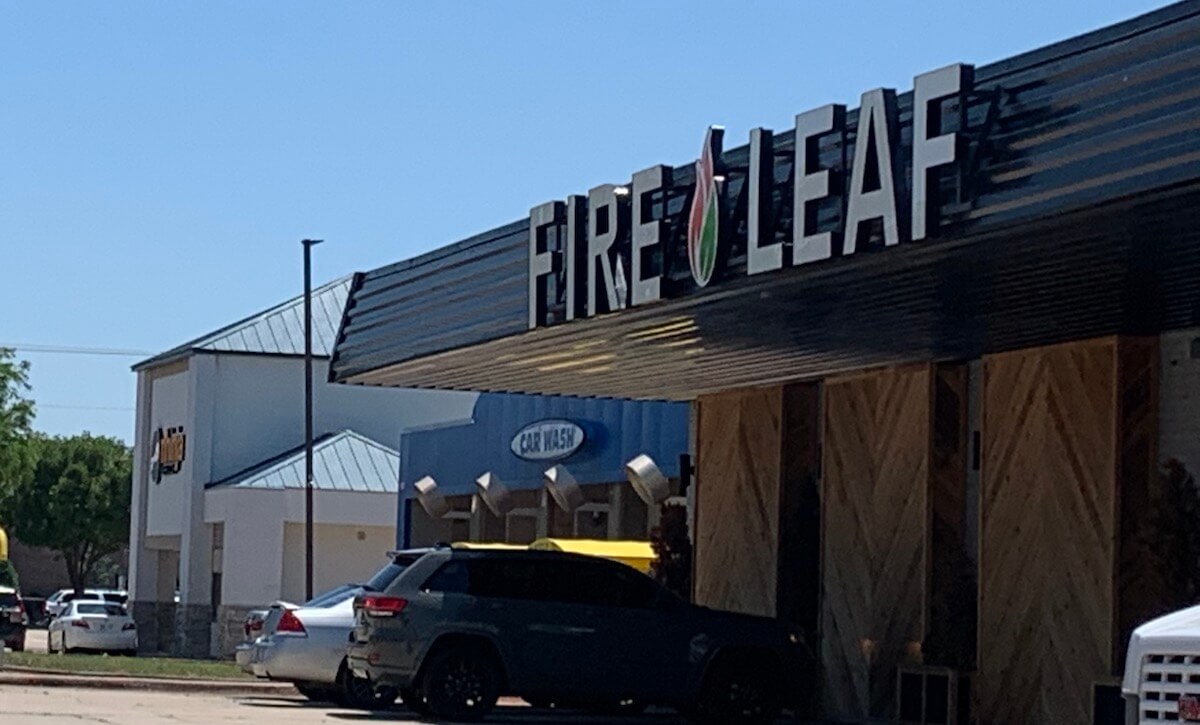

KINGFISHER — Chris McAlvain and Matt Blackwood were going by the books on their first crop — especially with their combined savings on the line.
They did their research, paid for their license, bought their equipment and cured their harvest for 40 days, three weeks past the minimum recommendation. The founders of Green Sky Pharms, located 45 miles northwest of Oklahoma City, released their first product to the market knowing its value, and they were satisfied.
This story was reported by Gaylord News, a Washington reporting project of the Gaylord College of Journalism and Mass Communication at the University of Oklahoma.
Then they got a letter from their credit card company.
“They had pinpointed some purchases at grow stores, and from us paying our license fee, you know,” McAlvain said, referring to stores selling supplies to marijuana growers. “They basically told us that we can’t use that card anymore, and if there’s one more charge on our card for anything that seems to be grow-related, then our card will be canceled, and our account will be shut down.”
Federal conflict
A day of reckoning may be coming soon for some of Oklahoma’s more than 9,000 marijuana business license holders. And federal bankruptcy laws aren’t going to protect them because while medical marijuana is legal in Oklahoma, it is still illegal on the federal level.
Since the legalization of medical marijuana in Oklahoma’s statewide referendum on State Question 788 in 2018, the lack of appropriate banking has been a paramount concern of budding cannabis businesses. McAlvain did not expect the issue to reach so far his company could be denied financial backing from something mundane like a credit card.
Starting mid-April, all of Green Sky Pharms’ transactions were cash only.
This is the reality of legally working in an industry still considered federally illegal under the Controlled Substances Act.
Legal marijuana is a big business in Oklahoma, grossing nearly $73 million in sales last month, breaking April’s record of $61.4 million when the fledgling industry paid an estimated $9.3 million in taxes, according to the Oklahoma Tax Commission.
Yet the conflict between federal and state marijuana laws has created a great deal of uncertainty.
For many banks, taking deposits from cannabis companies means risking violation of federal anti-money-laundering laws. Often, this means banks will refuse to do business with marijuana companies altogether.
Without these services, many companies must act as cash-only businesses, leaving them vulnerable to theft.
But clashing federal and state stances on cannabis have impacts outside of banking as well.
Medical marijuana businesses are subject to Section 280E of the Internal Revenue Code, which prohibits tax deductions for businesses trafficking Schedule 1 controlled substances, including cannabis. While enterprises can deduct what they spent for their products, anything beyond this is typically not deductible. This includes costs like employee salaries, rent and other business necessities.
For reasons like this, Stephen Holman, the general manager of the Friendly Market in Norman, said cannabis businesses typically show low profit margins.
“They’re low enough that it’s not surprising to me that so many places have closed,” he said. “I mean significantly less than what would be normal for a retail business.”
However, Holman expressed it was more than just high costs driving down profit margins. Because there is another challenge facing Oklahoma’s developing medical marijuana industry.
The competition
Oklahoma’s hyper-competitive medical marijuana industry as it stands is not sustainable long-term, according to Lawrence M. Cagigal, the southwest territory sales manager for GreenGrowth CPAs, a company helping those in the cannabis industry identify and implement finance and tax strategies.
“Oklahoma has more commercial licenses than any other state. Sometimes a whole series of states don’t add up to ours,” he said.
RELATED
After veto, some Oklahoma medical marijuana businesses in license limbo by Matt Patterson
As of June 1, there were 9,266 commercial cannabis licenses in the state.
“This year, you’re going to see a lot of attrition as people either shred their licenses or just flat-out go out of business,” Cagigal predicted. “The process is going to be sped up because it’s very hyper-competitive. Eventually, someone’s gonna go bankrupt.”
Cagigal believes this could come as early as July 15.
“We thought we would see that around March and April with the two original tax deadlines. With COVID-19, they’ve extended that to July 15,” he said.
Though medical marijuana sales rose significantly after the industry was deemed “essential” in April, Cagigal feels these COVID-19-related sales will not be a long-term solution. He hopes that this phenomenon will help some businesses weather this year’s tax season, but he anticipates sales will dip back down in the coming months.
For those who do go bankrupt, the options are limited.
Bankruptcy courts are a federal institution, and given the status of marijuana at the federal level, precedent suggests that traditional bankruptcy protection is not an option for struggling medical marijuana businesses.
“The Feds are not going to provide bankruptcy to something that they deem federally illegal,” Cagigal said, “which is somewhat hypocritical because they have no problem accepting tax money from it.”
Cannabis businesses that go under will have to seek non-traditional avenues for relief.
“You can merge with someone, maybe someone will buy you out, eliminate your debt,” Cagigal said. “If you can’t do any of those things, it was written into law here it’s possible to have a receivership situation, but that has yet to happen.”
Receivership would allow a court-appointed receiver to take control of a business. From there, the receiver can either liquidate that company’s assets or sell off the business to the highest bidder.
“It’s something,” Cagigal said. “It’s better than nothing.”






















